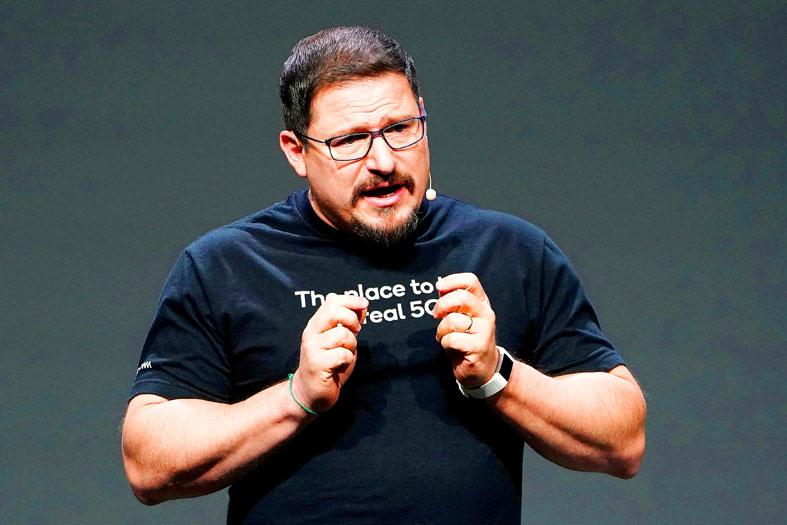Qualcomm Inc by next year will have just the chip for laptop makers wondering how they can compete with Apple Inc, Qualcomm chief executive officer Cristiano Amon said on Thursday.
Apple last year introduced laptops using a custom-designed central processor chip that boasts longer battery life. Processor suppliers Intel Corp and Advanced Micro Devices have no chips as energy efficient as Apple’s.
Amon said that he believes his company can have the best chip on the market, with help from a team of architects who formerly worked on the Apple chip, but now work at Qualcomm.

Photo: Reuters
In his first interview since taking the top job at San Diego, California-based Qualcomm, Amon said that the company is counting on revenue growth from China to power its core smartphone chip business, despite political tensions.
“We will go big in China,” he said, adding that US sanctions on Huawei Technologies Co (華為) give Qualcomm an opportunity to generate a lot more revenue.
A cornerstone of his strategy comes from a lesson learned in the smartphone chip market, he said.
It was not enough just to provide modem chips for wireless data connectivity in phones, Qualcomm also needed to provide the brains to turn the phone into a computer, which it now does for most premium Android devices, he said.
Now, as Qualcomm looks to push 5G connectivity into laptops, it is pairing modems with a powerful central processing unit (CPU), Amon said.
Instead of using computing core blueprints from longtime partner Arm Ltd, as it now does for smartphones, Qualcomm said that it needed custom-designed chips if its customers were to rival new laptops from Apple.
As head of Qualcomm’s chip division, Amon this year led the US$1.4 billion acquisition of start-up Nuvia, whose ex-Apple founders help design some those Apple laptop chips before leaving to form the start-up.
Qualcom is to start selling Nuvia-based laptop chips next year.
“We needed to have the leading performance for a battery-powered device,” Amon said. “If Arm, which we’ve had a relationship with for years, eventually develops a CPU that’s better than what we can build ourselves, then we always have the option to license from Arm.”
Phone chips accounted for US$12.8 billion of Qualcomm’s US$16.5 billion in chip revenue in its most recent fiscal year.
Some of Qualcomm’s best customers, such as phone maker Xiaomi Corp (小米), are in China.
Qualcomm is counting on revenue growth as its Android handset customers swoop in on former users of phones from Huawei, which was forced out of the handset market by US sanctions.
TIRIAS Research principal analyst Kevin Krewell called the plan a “political minefield” due to rising US-China tensions.
However, Amon said the company could do business as usual there.
“We license our technology — we don’t have to do forced joint ventures with technology transfers. Our customers in China are current with their agreements, so you see respect for American intellectual property,” he said.
Another major challenge for Amon will be hanging on to Apple as a customer.
Qualcomm’s modem chips are now in all Apple iPhone 12 models after a bruising legal battle.
Apple in 2017 sued Qualcomm, but dropped its claims and signed chip supply and patent license agreements with Qualcomm in 2019.
Apple is now designing chips to displace Qualcomm’s communications chips in iPhones.

The US dollar was trading at NT$29.7 at 10am today on the Taipei Foreign Exchange, as the New Taiwan dollar gained NT$1.364 from the previous close last week. The NT dollar continued to rise today, after surging 3.07 percent on Friday. After opening at NT$30.91, the NT dollar gained more than NT$1 in just 15 minutes, briefly passing the NT$30 mark. Before the US Department of the Treasury's semi-annual currency report came out, expectations that the NT dollar would keep rising were already building. The NT dollar on Friday closed at NT$31.064, up by NT$0.953 — a 3.07 percent single-day gain. Today,

‘SHORT TERM’: The local currency would likely remain strong in the near term, driven by anticipated US trade pressure, capital inflows and expectations of a US Fed rate cut The US dollar is expected to fall below NT$30 in the near term, as traders anticipate increased pressure from Washington for Taiwan to allow the New Taiwan dollar to appreciate, Cathay United Bank (國泰世華銀行) chief economist Lin Chi-chao (林啟超) said. Following a sharp drop in the greenback against the NT dollar on Friday, Lin told the Central News Agency that the local currency is likely to remain strong in the short term, driven in part by market psychology surrounding anticipated US policy pressure. On Friday, the US dollar fell NT$0.953, or 3.07 percent, closing at NT$31.064 — its lowest level since Jan.

The New Taiwan dollar and Taiwanese stocks surged on signs that trade tensions between the world’s top two economies might start easing and as US tech earnings boosted the outlook of the nation’s semiconductor exports. The NT dollar strengthened as much as 3.8 percent versus the US dollar to 30.815, the biggest intraday gain since January 2011, closing at NT$31.064. The benchmark TAIEX jumped 2.73 percent to outperform the region’s equity gauges. Outlook for global trade improved after China said it is assessing possible trade talks with the US, providing a boost for the nation’s currency and shares. As the NT dollar

The Financial Supervisory Commission (FSC) yesterday met with some of the nation’s largest insurance companies as a skyrocketing New Taiwan dollar piles pressure on their hundreds of billions of dollars in US bond investments. The commission has asked some life insurance firms, among the biggest Asian holders of US debt, to discuss how the rapidly strengthening NT dollar has impacted their operations, people familiar with the matter said. The meeting took place as the NT dollar jumped as much as 5 percent yesterday, its biggest intraday gain in more than three decades. The local currency surged as exporters rushed to